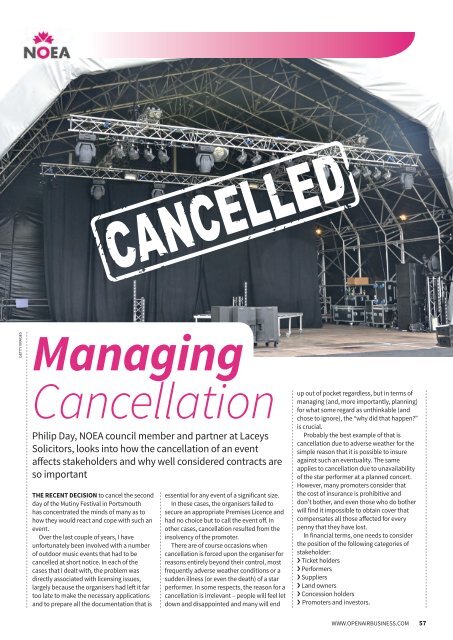Open Air Business June/July 2018
The UK's outdoor hospitality business magazine for function venues, glamping, festivals and outdoor events
The UK's outdoor hospitality business magazine for function venues, glamping, festivals and outdoor events
Create successful ePaper yourself
Turn your PDF publications into a flip-book with our unique Google optimized e-Paper software.
GETTY IMAGES<br />
Managing<br />
Cancellation<br />
Philip Day, NOEA council member and partner at Laceys<br />
Solicitors, looks into how the cancellation of an event<br />
affects stakeholders and why well considered contracts are<br />
so important<br />
THE RECENT DECISION to cancel the second<br />
day of the Mutiny Festival in Portsmouth<br />
has concentrated the minds of many as to<br />
how they would react and cope with such an<br />
event.<br />
Over the last couple of years, I have<br />
unfortunately been involved with a number<br />
of outdoor music events that had to be<br />
cancelled at short notice. In each of the<br />
cases that I dealt with, the problem was<br />
directly associated with licensing issues,<br />
largely because the organisers had left it far<br />
too late to make the necessary applications<br />
and to prepare all the documentation that is<br />
essential for any event of a significant size.<br />
In these cases, the organisers failed to<br />
secure an appropriate Premises Licence and<br />
had no choice but to call the event off. In<br />
other cases, cancellation resulted from the<br />
insolvency of the promoter.<br />
There are of course occasions when<br />
cancellation is forced upon the organiser for<br />
reasons entirely beyond their control, most<br />
frequently adverse weather conditions or a<br />
sudden illness (or even the death) of a star<br />
performer. In some respects, the reason for a<br />
cancellation is irrelevant – people will feel let<br />
down and disappointed and many will end<br />
up out of pocket regardless, but in terms of<br />
managing (and, more importantly, planning)<br />
for what some regard as unthinkable (and<br />
chose to ignore), the “why did that happen?”<br />
is crucial.<br />
Probably the best example of that is<br />
cancellation due to adverse weather for the<br />
simple reason that it is possible to insure<br />
against such an eventuality. The same<br />
applies to cancellation due to unavailability<br />
of the star performer at a planned concert.<br />
However, many promoters consider that<br />
the cost of insurance is prohibitive and<br />
don’t bother, and even those who do bother<br />
will find it impossible to obtain cover that<br />
compensates all those affected for every<br />
penny that they have lost.<br />
In financial terms, one needs to consider<br />
the position of the following categories of<br />
stakeholder:<br />
› Ticket holders<br />
› Performers<br />
› Suppliers<br />
› Land owners<br />
› Concession holders<br />
› Promoters and investors.<br />
WWW.OPENAIRBUSINESS.COM 57


















